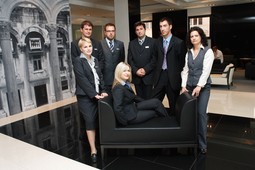Silvija Markotic, Josko Poparic, Pero Labus, Jelena Zitko, Darko Cavar, Tomislav Korosec and Dijana Jerkovic, the top people at the Atrium, an exclusive five star hotel in Split that, like other Croatian hotels, expects concrete government assistance in this crisisIf Croatian Government does not undertake urgent and radical measures to salvage the peak tourist season the total revenue from tourism could drop by 5 billion kuna, or ten percent, from last year. That means that Government's plan to secure the functioning of the country to the end of June with a three percent deficit with its recent implementation of a package of anti-recession measures, and then to count on the earnings from the tourism industry to improve the economic situation, would fall through. If these tourism earnings do not come through Government will be forced to implement some other radical measures.
"In a time when it is clear to all that the Croatian importer & debtor concept cannot survive, and when it is impossible to replace it with an exporter & manufacturing economic concept on short notice, everyone is focused on the tourist 'harvest' as a source of covering the country's foreign currency illiquidity," says Miroslav Dragicevic, one of the leading experts in tourism consultancy and the founder of Horwath Consulting Zagreb. Dragicevic feels that this attitude is reminiscent of the pleas of the thirsty in the desert because a tourism harvest, like the agricultural harvest, requires, besides good preparations, a happy combination of other circumstances.
"Even the actual concept of the 'harvest' that was successfully carried out over the past few years, as a few summer months of crowds, is mostly linked to the proximity of the market, the construction of roads and, above all, with natural beauty backed by the marketing concept of the Mediterranean as it once was. Little was done to seriously restructure and globalise our tourism industry in the real sense of the word. That is why it is to be expected that the global crisis and our thirst for economic growth, employment and foreign currency will force the political elite to deal with tourism as a serious global industry," says Miroslav Dragicevic.
That this was the case was indirectly confirmed by tourism minister Damir Bajs, who has announced measures aimed at salvaging the tourism season for the end of this month. Despite several months of warnings that Croatia could in fact be hit hard when it comes to tourism, Bajs has decided to wait until now to react. Over the past few months Croatian Government has doubled funds for the promotion of Croatian tourism in relation to last year, but that is the only measure that has been undertaken. Nacional has tried to get answers from the Ministry of Tourism and the Croatian National Tourist Board on several questions about the coming tourist season, and on concrete measures to salvage it, but no one has provided any information.
Silvia Markotic, the general manager at Split's five star Atrium hotel, tried to explain for us on what concrete examples hoteliers could be unburdened and where the state should help. "At the Atrium hotel we have consulted with hotels of a similar category and room availability. We learned, for example, that a similar hotel in Italy pays music royalties four times less than we do, year round. The hotels we contacted in Greece also pays much lower royalties, and has, for example, an average price per room of 200 euro, something Croatian high category hotels can only dream of.
What would be logical is a drastic reduction in the value of a point for hotels, because we cannot be competitive if we are paying 25,000 euro in royalties and Radio & Television subscription fee per year. The Radio & TV subscription fee should also be cut to 50% capacity as the occupancy rate in Croatia during the year is less than that. There is also the issue of the VAT, which was 0% in Croatia for organised arrivals, but was then set at a single rate of 10%, which led to a significant hike in prices the market initially absorbed. But now that tourism is faced with this massive challenge price policy is very important.
Croatia hotels cannot be in the same position as, for example, hotels on Malta, where their reduced VAT rate is 5%, or Spain's 7%, Turkey's 8%, Bulgaria's 7%, Luxembourg's 3%. Hoteliers in competing countries have no idea what a forestry contribution is, many do not have a monument annuity, water protection fees. For most hotels on the seaside it is easy to rack up over 20 various levies stipulated by law – from charges and membership fees to various contributions. And the cost of energy is massive and has increased by about 6%since the new tariff system was introduced in 2008."
Instead of all these measures, the only concrete one Government has undertaken when it comes to tourism was a significant increase in the finances available for marketing and advertising, which is in any event insufficient, and the results of which are questionable. "Since the Croatian tourism industry lacks DAMIR BAJS, Minister of Tourism, has announced measure aimed at salvaging Croatian tourism for the end of the monthstrong alliances with the centres of power in tourism distribution," says Miroslav Dragicevic, "we were not able to build serious crisis programs with these players (TUI, Thomas Cook and others) because their interests are in other markets where they have hotels and employ the services of a powerful aviation.
Now it is late to work on marketing for additional guest acquisition so we will, unfortunately, be left to the effects of proximity, beauty, the loyalty of nearby markets and other happy circumstances in the "last minute" booking phase. All realistic business people feel that a drop in hotel occupancy within the 10% range would be a success, but will by all accounts be greater than that. Camps will do better because there is no additional competition here, and quality private accommodation that already has its own guests will also fare well. Hotels and lower quality private accommodations, then, will be the key source of a drop in tourism turnover in 2009.
There is no doubt that all eyes will be turned to Government, which will have to find a way to mitigate to consequences by reducing fiscal and parafiscal contributions and above all to alleviate the loan debt burdens".
Some Croatian experts with whom Nacional spoke feel that the crisis is in some ways welcome, because if it lasts two years it will open a serious process of changes to the inherited socialist model of tourism. Unfortunately, they say, Croatian Government is, as a result of the hunger for foreign currency and a lack of money, not in a position to implement a model of "creative destruction" and launch a new development cycle in line with the global competition rules of the game in this industry. Just like the former Yugoslavia carried out the operation of a century in tourism from the mid 1960s to mid 1970s when today's hotels were built, which were alter only superficially reconstructed, so too should Croatia now carry out a similar operation appropriate to the present times.
A lot of attention was given over the past months to tourist fairs, the markets and visitors were sounded out, and numerous meetings were held with tour operators. Riviera Porec CEO Veljko Ostojic says that "Fairs are an increasingly less relevant barometer of tourism. They are one of the channels of the channels of distribution, and the basic indicator is the state of booking by various sales channels year over year, and that is currently negative. There are some indicators of more intensive last minute booking, as potential guests know that the offer, at least as far as the Mediterranean is concerned, is as a rule greater than the demand, i.e. that they will find vacancies.
And, as a result of the uncertainty caused by the economic situation, which is resulting in a continued reduction of jobs, some guests will make the decision in the last moment. Some are hoping for last minute discounts and campaigns in some Mediterranean destinations. All this means that last minute booking will be higher than in previous years, and that the current booking situation should not be cause for panic, although it is certain that the situation is serious." Ostojic points out that Croatian Government has secured additional funds for joint advertising, which is positive in any case.
But that is not enough. Potential overall losses to the national economy may be much greater than any possible additional investments into tourism. "Is it worth investing 100 to 150 million euro to not lose 700 million? Besides, we have started talking about tourism now, when the overall financial situation in the country is very serious. You cannot make any sector, including tourism, internationally competitive and attractive overnight.
We are all aware of the fact that tourism is something with which this country can be globally competitive and on the basis of which we can gain significant earnings and on which we can base long-term quality development. But there has never been a meaningful debate about tourism at the highest instances between tourism experts and the political elite.
Had there been as much money invested into tourism as there was into some other sectors such as finances, shipbuilding and the like, we would now have one of the world's most competitive products and would await a crisis with much greater ease. Croatia will be a tourism country when the tourism minister sits right next to the Prime Minister. The state has done nothing for the tourism industry during this time of crisis; just look at the European Union. A recent meeting of finance ministers agreed to reduce the VAT MIROSLAV DRAGICEVIC, a tourism marketing expertrate to 5,5 percent. How can we be competitive with our VAT rate?" asks Ostojic.
It could be said that Croatia, as a result of a chaotic and uncontrolled tourism transition model, never decided, as a matter of public policy, what kind of tourism it wanted. It did not find a solution for effective investment in tourism, it did not build new tourism infrastructure, it did not educate tourism and hotel professionals, nor did it find a model of central tourism management with a clear leadership and vision for a new and globally competitive tourist industry.
As a result of high barriers to entry and an inappropriate relationship towards tourism real estate, Croatia did not allow the internationalisation of its tourism industry through investors, brands and above all distribution alliances. Hoteliers say that they cannot lower prices, because operations in "normal" years is so burdened by various contributions that profitability is questionable. Veljko Ostojic pointed out the example of his own firm, which pays about seven million kuna a year in various water fees and contribution. "With additional price cutting the entire sector would 'sink' and it is an open question as to whether it could ever return to the existing price levels.
And half way through the booking period it is also technically difficult to implement. Let's not forget that the majority of tourism companies are privately owned, with exclusive competence over pricing policy. In short: prices can be lower if the business environment is more favourable for the economy. This is a rule valid for all sectors of the economy, including tourism," concludes Ostojic.
A DIFFICULT SITUATION FOR HOTELIERS
■ Croatian hotels are in a more difficult position than their competitors in the Mediterranean because of a high 22% rate of VAT. The rate of value added tax for hotels has been reduced in Malta to 5%, in Spain and Bulgaria to 7%, in Turkey to 8%, while in Luxembourg it is only 3%. Hotels in competing destination pay significantly lower music rights and many do not have a monument annuity and water protection fees. Hotels on the Adriatic coast pay over 20 various levies stipulated by law – from charges and membership fees to various contributions. And the cost of energy is massive and has increased since the new model of calculation was introduced in 2008 by about 6%, all of which makes doing business more difficult.







